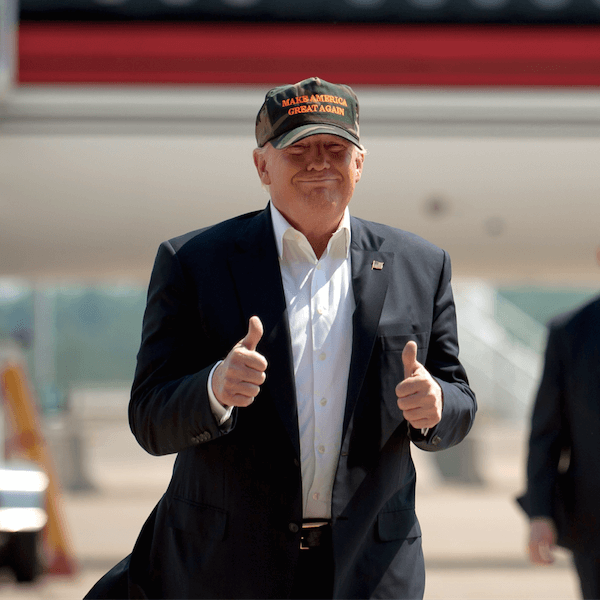The Donald Trump defense plan is right in line with his other campaign vows: bigger, better, cheaper.
The Republican presumptive nominee has made an array of sizable promises since announcing he’d try his hand at a new business: becoming president of the United States. Still, his vow to strengthen the military while cutting national defense spending might be the tallest task of the lot.
Big military, not big money
In a “Meet the Press” interview with Chuck Todd in 2015, Trump laid out his policy on military spending.
“It’s gonna be so strong, nobody’s gonna mess with us,” Trump said of the military. “But you know what? We can do it for a lot less.”
Is increasing military strength and simultaneously decreasing military spending a feasible promise?
[postquote]
To say that the United States spends a lot on the military would be a gross understatement. The President’s 2017 Fiscal Year Budget allocates $583 billion to the Department of Defense (DoD). In 2015, the DoD’s $596 billion expenditure surpassed the combined national defense budgets of the next seven largest military powers.
“America First”
During his “America First” foreign policy speech, Trump ultimately blamed wasteful defense spending and a weakening of the military on the Obama administration’s alleged lack of organization.
“Our foreign policy is a complete and total disaster,” he said. “No vision. No purpose. No direction. No strategy.”
Overextension of resources
In 2014, the United States spent over $5.9 billion on foreign military aid and nearly $35 billion on foreign economic aid, according to the government’s official Foreign Assistance summary report. Trump pointed a finger at these foreign aid expenses during his “America First” speech by proposing that the United States focus on its own economic affairs before volunteering to rebuild other nations.
The businessman went on to condemn the United States’ growing manufacturing trade deficit as the root problem behind the overall national debt. If he were able to reignite the manufacturing business, bring back jobs from overseas, and cut foreign aid, it’s possible that he would put that money towards military costs.
If Trump becomes president and sends 20,000 to 30,000 troops to Iraq like he said he would during a debate in March, those extra funds will be vital to paying off the cost of having more boots-on-the-ground. He expressed that, though he believes the wars in Iraq and Afghanistan were mistakes, ground troops and airstrikes will be necessary in defeating ISIS.
Support from other nations
The real-estate mogul-turned-presumptive GOP nominee has also requested that other nations opposed to ISIS chip into the battle. As China benefits from America’s environmental regulations and trade deals, other nations benefit disproportionately from the United States’ involvement in fighting ISIS, Trump suggested.
[slideshow_lib slideshow_id=”19359″ _index=”0″]
In his foreign policy speech, he called upon NATO allies to contribute more dollars towards national defense spending.
“Our allies must contribute toward their financial, political, and human costs, have to do it, of our tremendous security burden,” he advised. “But many of them are simply not doing so.”
Will it work?
According to RBC Capital Markets’ Robert Stallard, Trump’s insistence upon increased involvement in the Middle East could cause military spending to increase like it did during the wars in Iraq and Afghanistan.
“In fact, the more aggressive stance in both the Middle East and Far East arguably increase the chances of the US military becoming actively engaged in either region,” Stallard wrote in a note outlining each candidate’s possible impact on the defense spending budget. “And as we saw with Iraq & Afghanistan, these overseas operations can add over $100 billion to the base DoD budget in any given year.”
That being said, others have praised his willingness to suggest the military could use its funds more wisely when it comes to spending millions of dollars to maintain outdated or useless weapons.
“Donald Trump could be the only presidential candidate talking sense about for the American military’s budget,” Reuters’ Matthew Gault wrote in the publication’s “Great Debate” column.
The same goes for the candidate’s suggestion that other nations contribute to the common battle against ISIS. The question is how will the United States convince those nations to lend a hand.
Our take
Neither Trump nor Sec. Hillary Clinton has outlined a solid national defense budget that details specific costs. At this point in the race, the particulars are left up for speculation. However, each candidate’s intentions are clear.
Trump has expressed a crystal clear dissatisfaction with the way foreign policy and national defense spending have unfolded over the past year. The candidate has developed a tendency to link each issue to the economy and although he may be correct, it’s difficult to predict whether increased trade and manufacturing, for example, will contribute adequate funds towards a bigger military.
Have something to add to this story? Comment below or join the discussion on Facebook.
Header image: Getty









































